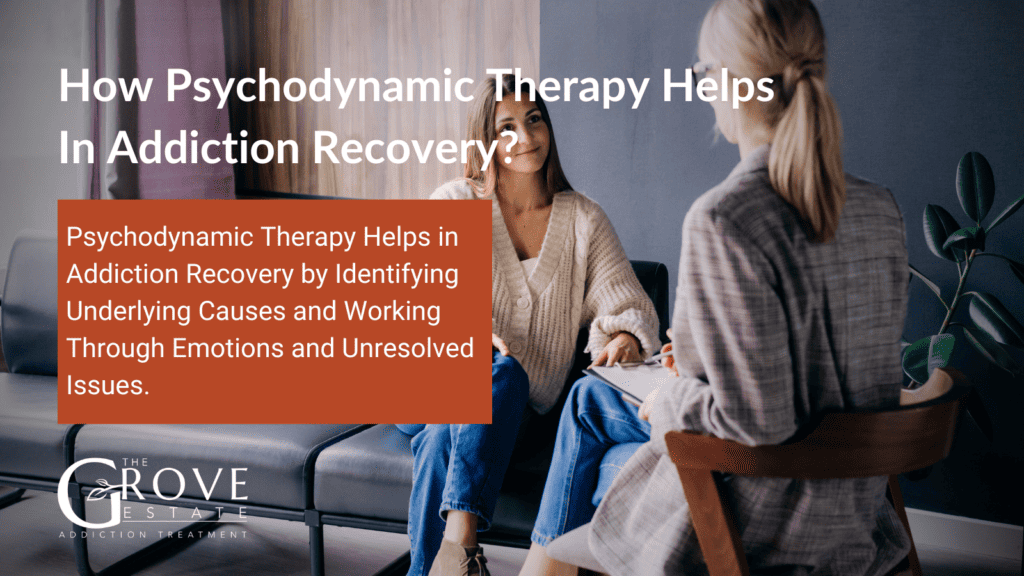Psychodynamic therapy for addiction explores unconscious processes, unresolved conflicts, and past experiences to understand the psychological roots of addictive behaviors. By gaining insights into thoughts, emotions, and behaviors related to addiction, individuals can address underlying psychodynamic factors, promoting long-term recovery and healthier coping mechanisms.
Research supports psychodynamic therapy’s effectiveness in treating various forms of addiction, highlighting its role in addressing addiction’s complexities at a psychological level.
Psychodynamic therapy for addiction can be an effective treatment for a variety of substance use disorders, including opioid use disorder, cocaine use disorder, and alcohol use disorder. The therapy typically involves a combination of individual and group counseling, as well as other forms of treatment such as medication and support groups.
Psychodynamic therapy for addiction can help individuals by understanding the patterns of behavior that lead to addiction and developing strategies for healthily managing those behaviors.
What Is Psychodynamic Therapy?
Psychodynamic therapy, founded by Sigmund Freud, is a talk therapy that examines the link between past experiences and present issues. By discussing problems, individuals gain insights into their emotions and mental processes, with a focus on unconscious factors influencing their behavior.
The goals of psychodynamic therapy include addressing the psychological roots of emotional suffering. It relies on the interpersonal relationship between the client and therapist, emphasizing self-reflection and self-examination. Derived from psychoanalysis and Freud’s theories, psychodynamic therapy explores clients’ needs, urges, and desires, making it a valuable option for various mental health conditions.

How Psychodynamic Therapy Helps In Addiction Recovery?
Psychodynamic therapy helps in addiction recovery by identifying underlying causes and working through emotions and unresolved issues. This form of therapy, which occurs once or twice a week with face-to-face sessions, makes the unconscious conscious, aiding in the treatment of mental health conditions and addiction. Psychodynamically trained clinicians, though lacking a coherent model for treating addictions, have significant contributions to offer to patients with substance use disorders.
Psychodynamic therapies demonstrate efficacy in treating alcohol, opiate addiction, and general substance abuse/dependence. A meta-analysis comparing psychodynamic with other treatments in substance addiction studies underscores the effectiveness of psychodynamic approaches. Drug addiction, viewed from a psychodynamic perspective, emphasizes the widespread impact on various aspects of addicts’ lives.
Psychodynamic therapy helps individuals in addiction recovery by:
- Identifying underlying causes: Uncovering deep-seated reasons like unresolved conflicts, dysfunctional relationships, and emotional pain.
- Developing self-awareness: Achieving a deeper understanding of emotions and thought patterns.
- Improving decision-making: Gaining insights into personal values and aspirations for better choices.
- Addressing emotions head-on: Processing and healing from past experiences contributing to addiction.
- Reducing the risk of relapse: Lowering chances of relapsing by addressing addiction’s root causes.
This therapy, often found in inpatient and outpatient rehab programs, takes several sessions to show results. It involves a therapist-client relationship based on an interactive process, with the therapist listening and gently encouraging the exploration of emotions and thoughts.
How is the Psychodynamic Approach Different for Addiction?
The psychodynamic approach to addiction therapy is different from other therapies in that it focuses on the individual’s emotions and how past events, thoughts, and circumstances shape their present behaviors. Psychodynamic therapy aims to help individuals understand the underlying reasons for their addiction, such as unresolved conflicts, dysfunctional relationships, and emotional pain.
By addressing these underlying causes, individuals can reduce their chances of feeling triggered to turn to drugs or alcohol again. Psychodynamic therapy also helps individuals develop self-awareness, improve decision-making, address emotions head-on, and reduce the risk of relapse.
Comparative studies have explored the efficacy of psychodynamic therapy about other approaches. For instance, research by E Driessen in 2017 found that psychodynamic therapy can be at least as efficacious as cognitive-behavioral therapy (CBT) for depression.
Is Psychodynamic Therapy Effective for Depression?
Yes, psychodynamic therapy has been found to be effective for depression. According to “Effectiveness of long-term psychodynamic psychotherapy: a meta-analysis” by Leichsenring and Rabung (2008), which reviewed multiple studies, psychodynamic therapy demonstrated a significant effect size in treating depression. This indicates that psychodynamic therapy can be an effective approach for addressing depressive symptoms.
Can Psychodynamic Therapy Help OCD?
Yes, psychodynamic therapy, specifically manual-guided short-term psychodynamic therapy (STPP), shows promise in treating Obsessive-Compulsive Disorder (OCD). A study conducted by F. Leichsenring in 2017 found that STPP could be an effective approach for individuals with OCD. This suggests that psychodynamic therapy may offer valuable therapeutic options for those dealing with OCD symptoms.

What Are the Key Components of Psychodynamic Therapy?
Key components of psychodynamic therapy include:
- Exploration of the Unconscious: Psychodynamic therapy delves into the unconscious mind to uncover repressed thoughts, emotions, and memories that may influence current behavior and mental health issues.
- Uncovering Defense Mechanisms: Therapists help clients recognize and understand defense mechanisms like repression, projection, and denial, which can be mechanisms for avoiding distressing thoughts and feelings.
- Free Association: Clients are encouraged to speak freely without censorship or judgment. This can reveal hidden emotions and thoughts that are crucial for self-awareness and healing.
- Interpersonal Relationships: Psychodynamic therapy emphasizes exploring how past relationships and attachments, especially with caregivers, influence current emotional and relational patterns.
- Transference and Countertransference: The therapist and client examine the dynamics of their relationship, including any transference (client’s feelings towards the therapist) and countertransference (therapist’s feelings towards the client). These dynamics shed light on unresolved issues.
- Dream Analysis: Dreams are interpreted to uncover unconscious material. This can provide insights into unresolved conflicts or desires.
- Resistance: Therapists work with clients to identify and overcome resistance to self-exploration and personal growth.
- Insight: Clients gain self-awareness and insight into their emotions, behaviors, and motivations. This awareness is a fundamental step toward resolving psychological difficulties.
- Change in Patterns: Through understanding and insight, clients have the opportunity to change maladaptive patterns of behavior, thoughts, and feelings.
Advantages And Disadvantages Of The Psychodynamic Approach In Addiction Treatment
Here are the advantages and disadvantages of the Psychodynamic approach in addiction treatment that you should be aware of.
| Advantages | Disadvantages |
| Provides insight into the underlying psychological issues that may contribute to addiction. | Time-consuming and expensive. |
| Identifies past trauma or experiences that need to be resolved. | Difficult to test the theories empirically. |
| Focuses on the individual’s unique needs and experiences. | Lacks concrete treatment techniques. |
| Emphasizes the importance of the therapeutic relationship. | Requires highly trained psychodynamic therapists. |
| This can lead to personal growth and development. | Not widely available or supported by health insurance plans. |
| Useful for addressing denial and resistance to treatment. | Outcomes can be difficult to measure objectively. |
| Accessible in both inpatient and outpatient rehabilitation settings. | Typical insurance plans might not include coverage for this psychotherapy, making it financially unfeasible for numerous substance abusers. |
| Therapy users learn lifelong abilities for maintaining sobriety and enjoying a satisfying life. | Does not address the immediate hazards that an addict might pose to themselves or others. |
How Effective is Psychodynamic Therapy in Addiction Treatment?
Psychodynamic therapy is effective in addiction treatment by addressing the roots of addiction, fostering self-awareness, and enhancing motivation for recovery. A 1997 study by PA Jerry found it effective for intravenous cocaine addiction in an outpatient setting. Success may vary based on the client-therapist relationship, self-awareness, and willingness to confront past experiences.
What Are The Techniques Used In Psychodynamic Therapy?
- Free association: This technique involves encouraging clients to speak freely about their emotions, desires, and fears to reveal vulnerable feelings that have been pushed out of conscious awareness.
- Transference: This technique involves the transferring of one’s feelings for a parent or other important figure onto the therapist. This can help the therapist and client understand how early-life relationships affect the client’s current relationships.
- Dream analysis: This technique involves examining the client’s dreams to uncover unconscious thoughts and desires.
- Role-playing: This technique involves the client and therapist acting out different scenarios to help the client understand and change problematic behaviors.
- Journaling/writing: This technique involves the client writing about their thoughts, feelings, and experiences to gain insight and understanding.
These techniques, when applied skillfully, can shed light on the client’s inner world, fostering self-awareness and personal growth.
Is Psychodynamic Therapy similar to other Psychotherapies?
Psychodynamic Therapy (PDT) is rooted in Freudian principles, emphasizing the role of unconscious forces in shaping behavior and emotions. PDT can be compared to Cognitive Behavioral Therapy (CBT), as both aim to increase self-awareness and control over mental health; however, PDT delves into past traumas’ impact on current emotions more than CBT.
Research on PDT’s effectiveness has been limited, raising skepticism, and therapists’ preferences vary, with some favoring more pragmatic approaches like CBT. Notably, success depends on the therapist’s skill, patient-therapist compatibility, and patient suitability for PDT, particularly for those with “internalizing” coping mechanisms.
Psychodynamic therapy distinguishes itself by focusing on unconscious processes affecting current mental states, seeking to alleviate symptoms and enhance overall well-being by understanding past influences.
How Can The Grove Help You?
Incorporating psychodynamic therapy into your treatment plan can offer valuable insights and support for addressing various mental health challenges. If you or someone you know is seeking professional assistance, consider reaching out to reputable treatment centers like The Grove Estate Addiction Treatment Center. While their approach may not exclusively involve psychodynamic therapy, they provide a range of evidence-based treatments to support individuals on their path to recovery. Take the first step toward a healthier and happier life by contacting The Grove today. Your journey to healing and well-being is within reach.

Share This Post



